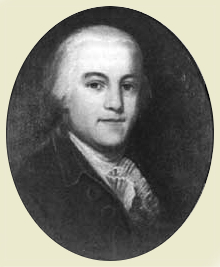Edward Rutledge was an American lawyer, a South Carolina governor, South Carolina delegate to the Continental Congress, a signer of the Declaration of Independence, and above all; a patriot. Edward, like so many of his time, risked his life and devoted his best years to seeing the birth of this beautiful country become a reality.

Edward Rutledge
Public domain image.
Edward Rutledge was born on November 23, 1749 in Charleston, South Carolina. He was the youngest of seven children. When he was old enough, he, lie his brothers before him, studied law in London at Inns of Court. In 1772, he passed the English foo.
Shortly thereafter, he returned to Charleston to start practicing law. On March 1, 11774, he married Henrietta Middleton, sister of Arther Middleton, fellow signer of the Declaration. Her wealthy father’s political connections would advance Edward’s career and make him the youngest member of Congress. The couple had three children together, one of whom died as an infant. Henrietta died in 1792, and he remarried, but he and his previously widowed second wife, Mary Shubrick Eveleigh, were childless.
When arriving back at Charleston, Edward had started a law firm with Charles Cotesworth Pinckney. The firm had taken off and made the two men very successful. It wasn’t long before Rutledge was one of the leading citizens in Charleston, and owned quite a bit of land and almost 50 slaves.
In 1775, Edward was asked, along with his brother, John, to go to represent South Carolina as a delegate to the <a href=”second-continental-congress.html”>Continental Congress</a>. At first, Rutledge was instructed by South Carolina leaders to directly oppose Lee’s Resolution for Independence. They believed that the time was not yet right for something like that, that they would strike too soon, and be defeated by the British.
In a letter to John Jay, Rutledge wrote, “The Congress sat till 7 o’clock this evening in consequence of a motion of R. H. Lee’s resolving ourselves free & independent states. The sensible part of the house Opposed the motion…They saw no wisdom in a Declaration of Independence, nor any other purpose to be answered by it…No reason could be assigned for pressing into this measure, but the reason of every Madman, a shew of our Spirit…The whole Argument was sustained on one side by R. Livingston, Wilson, Dickenson & myself, & by the Powers of all N. England, Virginia & Georgia on the other.”
He is held responsible for delaying the vote for Independence. His youth and vigor lent him energy older men didn’t have, and he grew to be one of the loudest and most influential anti-independence voices in Congress. However, by the time July of 1776 arrived, Edward was instructed to vote on behalf of South Carolina in favor of independence, and, for the sake of unanimity, he convinced his party concede. Later that year, Edward Rutledge signed the Declaration of Independence. At the age of 26, he was the youngest man to sign that document.
Interesting Facts About Edward Rutledge
• Being a slave owner from the south, he worked hard to expel the Negroes from the Continental Army. Most slaveowners felt that arming former slaves would only lead to rebellion in the future.
• As the youngest man in Congress, he had to contend with much older, staid men. John Adams, a particularly conservative man, wrote in his diary, “Young Ned Rutledge is a perfect Bob-o-Lincoln—a swallow, a sparrow, a peacock who wastes time debating upon points of little consequence; excessively vain, excessively weak, and excessively variable and unsteady; jejeune, inane, and puerile.” Adams’ friend Benjamin Rush, however felt the complete opposite, commenting on his orating skills and called him a “sensible young lawyer.” Even the great orator Patrick Henry was impressed with Edward’s eloquence.
• Edward and John Rutledge supported each other very openly in Congress. The brothers didn’t allow the strife and intense arguing come between them.
• Edward’s sisters-in-law (by his second wife Mary) also married signers of the Declaration; one married Thomas Heyward, Jr. and the other Thomas Lynch, Jr.
In November of 1776, Rutledge returned to South Carolina and took a seat on the South Carolina Assembly. He also became Captain of Artillery in the South Carolina Militia. He fought in the battle of Beaufort in 1779. The following year however, he was taken prisoner of war at the fall of Charleston, along with his brothers-in-law, Thomas Heyward and Arthur Middleton. He was held by the British in St. Augustine until July of 1781.
After his release, he returned home and returned to his duties on the South Carolina Assembly. He actively served there until 1796, sometimes serving on 19 different committees. He was elected to the Senate a couple times, and in 1798, he was elected governor the state, aligned with the Federalist party. Although he supposedly fought against the anti-slavery paragraph in the original draft of the Declaration (this was never been corroborated with actual written evidence), he did oppose the opening of the African slave trade at this point in his career, even though he owned many slaves. Perhaps, like some of his colleagues, he intended to support the Act for the Gradual Abolition of the Slave Trade.
Edward was on the committee that wrote the Articles of Confederation, though he did have some reservations about the document, that turned out to be well-founded. “I am resolved to vest the Congress with no more Power than what is absolutely necessary,” he wrote to John Jay. Many felt the Articles were incomplete, and before too long, they were replaced by the Constitution, which he voted in favor of.
While attending an important meeting in Columbia, he fell ill with gout and had to return home. He died before his term was up on January 23, 1800. Edward Rutledge now rests in peace in the cemetery of Charleston.


